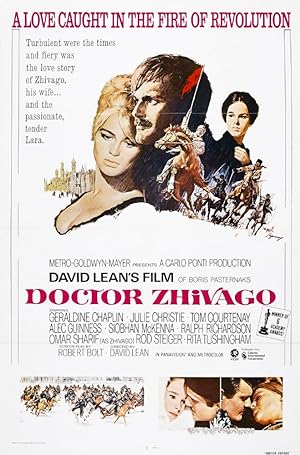Doctor Zhivago
| 1965Directed by: David Lean
Main Plot
Doctor Zhivago follows the life of Yuri Zhivago, a talented physician and poet, as he navigates the tumultuous backdrop of the Russian Revolution and World War I. The story begins in pre-revolutionary Russia, where Yuri is orphaned and later becomes a doctor. He falls in love with Lara Antipova, a woman entangled in a complicated relationship with a powerful figure. As the revolution unfolds, Yuri and Lara's lives become increasingly intertwined amidst the chaos of war, political upheaval, and personal loss. The film explores themes of love, loyalty, and the impact of historical events on individual lives, as Yuri struggles to find his place in a rapidly changing world. The narrative weaves through the challenges faced by the characters, highlighting their resilience and the enduring power of love against the backdrop of societal turmoil.
Characters
- Omar Sharif played Yuri Zhivago, a physician and poet caught in the turmoil of the Russian Revolution, navigating love and hardship.
- Julie Christie plays Lara Antipova, a passionate and complex woman entangled in a love affair with the protagonist, Yuri Zhivago, amidst the turmoil of the Russian Revolution.
- Geraldine Chaplin plays Tonya Gromeko, Yuri Zhivago's devoted wife, who supports him through the tumultuous events of the Russian Revolution and its aftermath.
Ending Explained
In the ending of Doctor Zhivago, the narrative culminates in a poignant resolution of the central conflicts surrounding love, loss, and the impact of historical upheaval. As the Russian Revolution unfolds, Yuri Zhivago's life is marked by separation from his beloved Lara Antipova. The film concludes with Yuri's return to Moscow, where he searches for Lara, but is ultimately unable to find her. Instead, he learns of her tragic fate, which underscores the devastating effects of war and political turmoil on personal lives. Yuri's journey reflects the broader themes of the film, illustrating how individual desires are often crushed by the weight of history. In the final scenes, Yuri is seen writing his poetry, a symbol of his enduring spirit and creativity despite the chaos surrounding him. The film closes with a sense of melancholy, as Yuri, now isolated and reflecting on his memories, embodies the struggle between personal passion and the harsh realities of life. The ending reinforces the idea that love, while powerful, can be fleeting and is often overshadowed by external forces. Ultimately, Doctor Zhivago leaves viewers with a bittersweet understanding of the intersection between personal and political realms, highlighting the enduring human spirit amidst tragedy.
